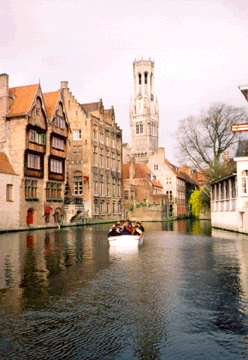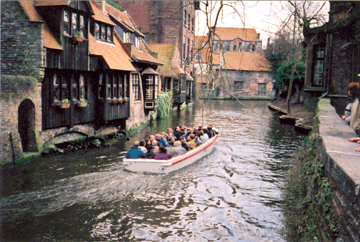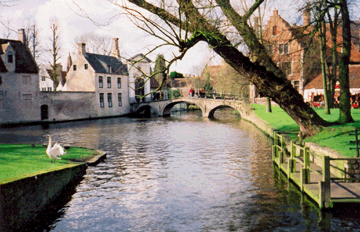 Last Time in Bruges,
Last Time in Bruges,a short story by Jay Mandal
It had been a spur-of-the-moment thing, their decision to return to Bruges. They’d been there years before, and had heard that it hadn’t changed much. For that, they were grateful; there was too much that had changed recently, or perhaps it was just that they were older and less resilient.
A second honeymoon, Patrick had called it, just in fun, but Roger didn’t mind; it would be pleasant to get away for a few days. Early spring. Before the crowds, but -- if they were lucky -- reasonable weather, although nothing could ever be guaranteed in northern Europe. A chance to forget the daily slog and to concentrate on what was really important. Who could tell if they’d get another chance?
Roger came from Southampton, was 5’9”, had blue eyes, and was now completely bald. Patrick was a couple of inches shorter, and had blue eyes -- though his were a darker shade -- curly brown hair, and a soft Irish accent. They’d met in London, where Roger was in his last year at university in the days long before student loans had been dreamt of; and Patrick was working for a bank when banks were still crying out for staff.
After a brief fling, they’d lost touch for a couple of years, but then met again at a party where they realized that the mutual attraction was still there.
Eventually they’d moved in together.
Patrick drove to Dover; then they caught the ferry to Calais; and then, finally, they drove on to Bruges. As they crossed the Franco-Belgium border, they grinned at each other.
“Remember our first taste of Belgium?” asked Roger.
“Smell, more like,” said Patrick. “What on earth had they put on those fields? No wonder it was so strong—you’d opened the window!”
“I was hot. Anyway, I kept it closed for the rest of the journey. Next exit,” he added after a while.
Their hotel was a large, modern two-storey building owned by a big hotel chain and seemingly in the middle of nowhere. They’d hoped to book somewhere with a bit more character, but had left it too late. At least here there was no problem parking, and the receptionists were polite and incurious when they checked in to their double room.
Patrick played with the television remote control (“Hey, there’s BBC1, BBC2 and ITV!”), while Roger investigated the bathroom. The tap was the sort where one lever controlled both the flow and the temperature of the water. It was tricky; Patrick, a left-hander, had never mastered the art. Roger smiled as he read a notice in French. “Come in here,” he called.
Patrick joined him. “Rearm?” he said disbelievingly. “What is it -- a hairdryer or a nuclear warhead?”
“Must have gained something in the translation.”
“So what do we do now?” asked Patrick, grinning mischievously.
“It’s only three o’clock! I thought you’d want to do some sight-seeing.”
“OK. Sight-seeing and then sex!”
“I might be tired,” Roger warned him. “I’m not as young as I used to be.”
“Then we’d better go easy on the sight-seeing. We could pretend to be tourists. You know, go for a ride in a horse-drawn carriage or in a boat on the canals.”
“We are tourists, Patrick!” But he knew what Patrick was trying to do, knew there was seriousness beneath what seemed sometimes like flippancy.
“No, we’re not -- we’ve been here before, don’t forget. We’re practically locals. I could tell you exactly how to get to that bridge we sat on where the woman took our photo.”
“I was sure this was it,” said Patrick, puzzled. He’d already led them to several bridges which, for one reason or another, had been discounted. “But I don’t remember those steps going down to the water.”
“It’ll do me,” Roger said, hoping Patrick would be satisfied. “Anyway, you can’t see if there are steps in the photo.”
“I suppose not,” Patrick conceded. He’d had enough of bridges, too. “But there’s one thing I’m sure I can find.”
“What’s that?”
“Somewhere to eat!”
The cafe, when they found one which met Patrick’s requirements -- namely, that it sold waffles -- was in Wollestraat. It was long and narrow and surprisingly light, and the waitress was patient even when Patrick couldn’t decide.
“We can always come back,” said Roger. “We don’t go home till Friday.”
That settled it: Patrick would have waffles with strawberries and cream. Roger ordered a pancake with ice cream and raspberry sauce.
“This is delicious,” he said, after a mouthful.
Patrick, devouring his waffle, just nodded.
Eventually, they tore themselves away, and wandered around the centre, looking at the lace shops and the craft shops and the chocolatiers.
“Mmm,” murmured Patrick, looking at a tempting display of Belgian chocolates.
“We’ll get some before we go home,” Roger promised, smiling at Patrick’s enthusiasm.
“It was a good idea, wasn’t it? Coming here?”
“Yes, of course it was.”
“I just thought ...”
“We could get things in perspective?” Roger teased gently, waiting for Patrick to see—quite literally—the joke.
Patrick smiled. “Yeah.” He, too, had seen the trio of buildings which defied conventional lines and symmetry. He wondered if they’d been built at different times, or if they’d just settled differently. Certainly, if you painted them the way they were, most people would assume you’d failed to capture them accurately.
“Shall we go back?” said Roger.
“You know I love you?” said Patrick afterwards, as they lay curled together on the double bed.
“For better, for worse ...” Roger said lightly.
“For better, for worse ...” Patrick repeated as he rested his head on Roger’s chest, unable to continue. There had been a time when they used to say the next few lines, but things had been difficult lately. Maybe the holiday would help. Things had been difficult the last time they’d come to Bruges, too ...
“What shall we do tomorrow?” asked Patrick.
“Climb the bell tower?”
Patrick laughed. “How many steps are there?”
“Three hundred and sixty-six.”
“Oh, yes. I remember wondering whether it was chance or if there really was a step for every day.”
“The view was spectacular,” said Roger.
“It reminded me of Italy. I hadn’t expected all those red roofs.”
“And d’you remember the bells?”
Patrick smiled. “I was deaf for the rest of the day! It was your idea we went up just before noon.”
“I didn’t think.”
“Neither did I.”
“Why don’t you go up?” suggested Roger. “I’ll wait for you in the square.”
“I’m not sure I could manage it now. Besides, we’ve got the pictures from last time.”
“Mmm.”
Patrick picked up the guide book to Bruges. “’Canals were built connecting Bruges to Zeebrugge, Ostend and its old rival, Ghent,’” he read. “’When the River Zwin silted up in the 15th century, the merchants decamped to Antwerp, but recently Flanders’ former capital has witnessed a revival in its fortunes, attracting more than two million visitors each year.’ If the weather’s nice, we could go on a boat trip along the canals,” he suggested. “And if it’s wet, maybe a museum. Or we could buy some souvenirs. Your mother asked if we could get her some more lacework, and I’d like to get something for my sister.” When there was no response, he glanced at Roger. Roger was asleep.
For a while, Patrick lay still. Then, when a tear dropped on to Roger’s hairless chest, he brushed a hand across his eyes, and, very quietly, got up and went into the bathroom.
The next day was the sort you dreamed about: clear and bright, the sun pleasantly warm, the air invigorating. As they walked through the town - technically it was a city - Roger thought again how much it reminded him of both Venice and Amsterdam, although that was to detract from Bruges in its own right. True, it was old and had canals, and, like Amsterdam, hordes of cyclists on old-fashioned bikes -- none of your state-of-the-art cycles and helmets here - but life seemed less hectic. The locals were tall and stylish like Italians - or perhaps they were Italians as there were many overseas visitors wandering up and down the cobbled streets.
They had to queue for a little while, but soon they were sitting in one of the boats which took tourists along the city’s canals. Their guide, who was also responsible for steering, cast off, and they pulled away from the small jetty, watched by those waiting for the next boat.
 They smiled as they realized that, at last,
they’d found the bridge they’d spent much of the previous afternoon
searching for. Many of the stone bridges they saw were several
centuries old, some too low for their boat to pass under. The arches
touched their own reflections to become ovals in the water. They passed
a former hospital; the building which had once been the British Embassy
but which was now a nursery school; and a museum which housed paintings
by Flemish artists. Some of the houses had lattice windows which
overhung the canals, and many had ornate gables.
They smiled as they realized that, at last,
they’d found the bridge they’d spent much of the previous afternoon
searching for. Many of the stone bridges they saw were several
centuries old, some too low for their boat to pass under. The arches
touched their own reflections to become ovals in the water. They passed
a former hospital; the building which had once been the British Embassy
but which was now a nursery school; and a museum which housed paintings
by Flemish artists. Some of the houses had lattice windows which
overhung the canals, and many had ornate gables.“What now?” asked Roger, after the guide had helped them off.
“Let’s have a hot drink - somewhere inside.” He’d noticed Roger shiver as they passed along a shady part of the canal. Out of the sun, it could be quite cold, and here, near the water, damp. Roger had had a bad chill a few months earlier, and Patrick was still worried about him. He tried to mask his concern by adding lightly, “Maybe we’ll find somewhere that does pancakes, too.”
They stopped at one of the cafes surrounding a large cobbled square. From a glassed-in terrace, they watched the tourists milling about, and felt pleasantly idle.
“I could sit here all day,” said Roger, more relaxed than he had been in a long time.
As they strolled through the town, Roger felt again the desire to link arms with Patrick, but he didn’t know the law and customs of this foreign city. Would they just look faintly ridiculous, a couple of middle-aged queers? Bruges felt safe, full as it was of tourists and students, but it took only one person to object to their sexuality and the holiday would be spoiled. It was easier to let it go.
 They spent several hours just looking around.
They wandered down alleys each of which seemed to lead them back to a
canal or to one of the squares with its intricately carved buildings,
the architecture of the newer ones blending in with that of the old;
they tried to interpret Flemish street names; and they arrived
unexpectedly at the white walled Beguinage still used as a convent, its
lawn bright with yellow daffodils. Nearby, on the grassy area between
the canal and the street where carriages waited, a pair of swans
preened themselves. Roger remembered hearing a long time before that
swans mated for life. He’d wondered then what their secret was.
They spent several hours just looking around.
They wandered down alleys each of which seemed to lead them back to a
canal or to one of the squares with its intricately carved buildings,
the architecture of the newer ones blending in with that of the old;
they tried to interpret Flemish street names; and they arrived
unexpectedly at the white walled Beguinage still used as a convent, its
lawn bright with yellow daffodils. Nearby, on the grassy area between
the canal and the street where carriages waited, a pair of swans
preened themselves. Roger remembered hearing a long time before that
swans mated for life. He’d wondered then what their secret was.Later that afternoon, they sat outside enjoying the spring weather and lingering over a cup of strong coffee which, as usual, was served along with a small rich chocolate. On one side of the market square, striped umbrellas -- some red and yellow, some green and yellow -- made a bold splash of colour against the grey of the cobblestones.
The sun was warm on Roger’s bare head. He was glad he’d gone bald, although, if it stayed warm, perhaps he’d have to think about buying a hat. He’d never really liked his bright red hair, and hadn’t minded losing it. Funny, Patrick said that was one of the first things that had attracted him, his hair. He knew other people had always noticed it, too, but it had made him feel conspicuous.
“D’you think this is the same cafe as all those years ago?” asked Patrick softly.
“Maybe,” Roger replied, his mind drifting. All those years ago ...
It was all going too fast for him. The decision to buy a house together, the visit to the building society to arrange a mortgage, letting their family and friends know ... He wanted to tell Patrick to slow down, that it was too much, too soon, but he was on a roller-coaster and couldn’t get off. His love for Patrick was being worn down, trampled, suffocated by everyday routine.
Eventually he couldn’t take any more, and stayed out until four in the morning. He slept in the spare room -- well, spent the night there, his body still tingling. For months he’d tried to find the right words to tell Patrick he was leaving. He couldn’t take the commitment involved, the responsibility, the feeling he’d been backed into a corner.
And then, suddenly, everything slipped into place. His certainty about what he wanted from life, his confidence that he was doing the right thing, his love for Patrick. He’d come through some sort of identity crisis and was the stronger for it.
It was the only time he’d ever been unfaithful to Patrick.
He looked across at his partner, who’d been waiting patiently, and smiled.
Patrick glanced down at the table, then looked up into Roger’s eyes. “I’m glad you stayed. I wouldn’t have wanted you to go.”
For a while, neither spoke. Then Patrick continued.
“I knew I’d pushed too hard. I needed you so much, you see. I didn’t know what to do. So I just waited.” He stopped and swallowed. “Whatever happened, it doesn’t matter.” In his eyes, there was both understanding and compassion.
Roger had always wondered if Patrick had guessed. He wondered why his partner had to tell him now, just when thoughts of leaving him were again uppermost in his mind. He loved Patrick, but sometimes love just wasn’t enough.
They lapsed into an undemanding silence, punctuated every once in a while by the sound of hooves as a horse-drawn carriage passed by.
The days passed quickly. For Roger, it was a relief when the film in their camera ran out: now he could relax and not have to think whether a particular view would make a good photo. True, they could buy some more film, in fact Patrick had wanted to, but Roger persuaded him against it. A genial American tourist had already taken a picture of them standing next to each other in front of the Town Hall.
“We’ve got enough photos,” Roger said. For a split second, he glimpsed the anguish in Patrick’s eyes, then it was gone.
While they walked along Zuidzandstraat, a white balloon had come sailing towards them. Smiling, Patrick had managed to catch it, and together they took it back to the little boy who’d accidentally let go of its string. The mother had been inordinately grateful, and had tried to thank them in English once she’d realized they were foreigners. They’d smiled and shrugged and nodded, too, and accepted one of the sweets the child had held out.
They finished their shopping. The sky was grey now, and it had turned cold. Tired of sight-seeing, they went straight back to their hotel. This time tomorrow they’d be on the ferry heading for Dover.
Patrick now lay asleep on the bed, while Roger quietly packed some of their things. Patrick had had a bad night; Roger who didn’t sleep much these days, had heard him tossing and turning. The last few days had been a well-needed breathing-space for both of them, but they’d known it couldn’t last. It was time to go home.
Suddenly overwhelmed by emotion, Roger sat down on the edge of the bed, careful not to disturb Patrick. The fear was back again, fear of what was to come. It had haunted him, haunted them both for the past two years, ever since the doctor had confirmed what Roger already suspected. He’d undergone the treatment they’d recommended, but the specialist had warned him at the outset that they might not have caught it in time. Now there was nothing more they could do. He loved Patrick with all his heart, but it no longer made any difference. The cancer was only in remission. This would be their last time in Bruges.
The End
Jay is from Southern England. After grammar school, he joined a City bank and worked in Europe. He’s written eighty short stories, fifty of which have been published, and two novels. ‘Slubberdegullion’ and ‘A Different Kind of Love’ are collections of short works, while ‘The Dandelion Clock’ is a novel. Speakout magazine has published at least one Mandal story in each issue, and his short stories have been featured in popular publications such as Passport and Lookout.
